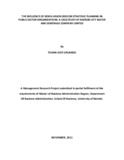| dc.description.abstract | The purpose of the study was to determine the influence of the government’s vision 2030 on strategic planning of Nairobi City Water and Sewerage Company Limited (NCWSC).The study narrowed its research undertakings into the challenges facing strategic planning, the influence of vision 2030 on the organization and the measures put in place to ensure that company strategic planning conforms to it. The study adopted a case study design to determine the influence of Vision 2030 on Strategic Planning in Public Sector Organizations. The study relied on primary data collected using a structured open-ended questionnaire (see appendix 2). Interviews were conducted with 9 management staff working at Nairobi Water Company offices situated in Industrial Area, Nairobi. The interviewees included; managing director, Director technical services, director financial and HR administration services, director commercial services, planning monitoring and evaluation manager, informal settlement department manager, engineering manager, operational and maintenance manager and ICT manager. Qualitative data was obtained and analyzed logically and systematically using content analysis procedures.
The study found out that alignment of the company strategic planning process at the company is steadily being moulded alongside that of the vision 2030. However, progress was hampered by sudden change in top management of the company, weak production capacity, engineering challenges, poor water supply infrastructure, governance challenges, inadequate human resources, ineffective use of ICT, lack of quality assurance, high levels of insecurity that led to vandalism of water supply lines, financial management challenges and environmental regulations compliance challenges. The study concluded that NCWSC, though only in operation for seven years, has achieved a marked improvement in service delivery and intends to continue improving this processes. To achieve its objective of delivering quality and reliable water and sewerage services to the residents of Nairobi. The company will rely on the continued support from consumers, government, development partners, civil society and the private sector, including banks. The study finally recommends that: the company should strengthen its human resources capacity by recruiting competent and high performing staff through a job evaluation exercise, salary review and corporate restructuring to right-size the organization; automate all its functions by incorporating ICT in all job task functions through an effective Enterprise Resource Planning (ERP) System; employ sound procurement practices as per the stipulated guidelines in the procurement act; strengthen the water supply infrastructure by replacing the old leaking pipes with new and long lasting pipes; minimize cases of vandalism by engaging lawyers and security to increase surveillance; conduct age-analysis of assets; identify areas with dilapidated infrastructure; procure contractors’ services and supervise works effectively. The company should also expand its water production capacity by constructing more boreholes and dams, redesign and construct waste water infrastructure, maintain and rehabilitate sewer networks and rehabilitate waste water treatment plants. The company should target low level of non revenue water (NRW), provide accurate meter readings, bill on 30 days cycle, operationalize and sustain underground leak detection, identify priority areas, procure adequate meters, replace meters as per strategic objective, and organize and execute awareness campaigns to educate customers on water and sanitation issues regularly. Finally the company’s policy reforms should aim towards improving technical, commercial and financial performance to maximize efficiency gains; reducing government financial burden; attracting skilled expert personnel in management and private finance for investments; and realigning the institutional set-up/structure with changing business environment to meet consumer and stakeholder expectations. | en |

